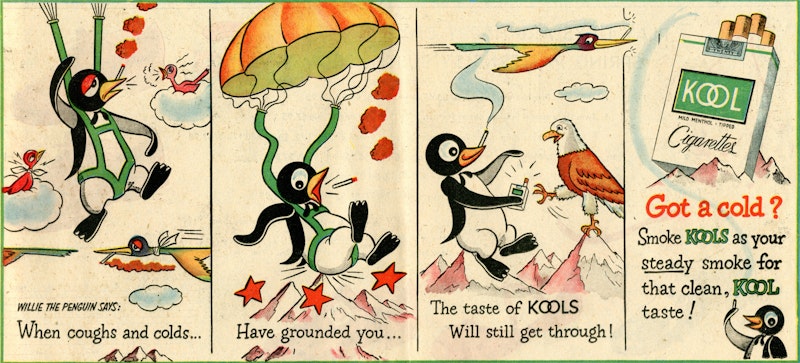In today’s vapid social media climate—the substitute for actual journalism—almost no government decision, political trend, polls about the 2022 Senate elections, or celebrity gossip goes unremarked upon. Pro and con. The more virulent and vulgar the better. Beto for President. Smokey the Bear says, “Fuck you” to Trump. Justin Bieber in marriage mystery. Millennials aren’t getting any. Mike Bloomberg, ahead of his undoubtedly short-lived consideration of running for president, donates $1.8 billion to his alma mater Johns Hopkins University, and gets a mixed reaction.
That’s why I was stunned that the Food and Drug Administration’s plan to ban menthol cigarettes (bundled with flavored e-cigarettes) elicited almost no response from the commentariat that’s expanded about 100-fold in the past decade. I’m opposed to any prohibition of retail items—people have the right to choose if they want to consume unhealthy products and toss the dice—but what really took me aback was the lack of racism cries from the left, since menthol cigarettes, and cigars, are purchased disproportionately by African-Americans (or in “progressive” circles, the “marginalized”). The FDA’s plan, according to The Wall Street Journal and New York Times, will face a legal maze in the next couple of years, but I’ve no doubt that the inequity of this decision will relative soon become law.
Why menthols? It strikes me as a paternalistic, nanny-state idea that’s aimed at one segment of the country’s population, not entirely different from the various local taxes on the euphemistically-named “sugary drinks” (soda), a regressive measure that harms the least prosperous members of society. It’s a far smaller market, but if soda is taxed, why not the $6.07 calorie-laden coffee concoctions—loads of whipped cream, sugar, caramel and chocolate drizzles—sold at Starbucks? Or the entire inventory of Ben & Jerry’s and every other ice cream purveyor? Is that not classism?
Why aren’t unfiltered Lucky Strikes (admittedly far less popular than 50 years ago) or the Big Gun, Marlboro, being put on the FDA chopping block as well as Kools, Salems and Newports?
Prohibition, as was learned in the 1920s, causes more problems than it solves, and one can see the black market for cartons of Newports booming in, say, 2021.
I remember when tobacco advertising was banned from TV in 1970, and even as a 15-year-old (who smoked Kools, a menthol habit that switched to Alpines, Newports, and Merits until I was 31) it struck me as strange that alcohol faced no such restrictions. Completely arbitrary, unless the liquor industry’s lobbyists and lawyers are more powerful than those representing companies that sell cigarettes, which is unlikely.
This isn’t a brief supporting the use of tobacco—I smoke (non-menthols now), despite the clear hazards—but rather the inherent hypocrisy. Smoking does kill people—whether from cancer, heart or respiratory complications—but not as quickly as booze. You don’t hear about fatal automobile accidents because a driver was sucking on a Winston or Kool (or joint, for that matter). That’s drunk-driver territory (and potentially more lethal, motorists who text or yak on cells at every hour of the day). Alcohol, as opposed to tobacco, causes far more broken marriages, violence and loss of employment, yet watch any sporting event on TV and you see attractive couples kicking back with a Budweiser, Sam Adams or Jack Daniel’s highball.
(I wonder if the menthol ban is successful if the FDA next sets it sights on malt liquor, say, or Hennessy cognac, again, with an outsized popularity among African-Americans.)
And then there’s the so-absurd-it’s-comical battery of TV advertisements for prescription drugs—again, with models demonstrating the happiness that such pills offer—that use more than half of a minute-spot listing the various side effects that consumers might suffer, including worse depression, four-hour erections, dizziness, heart problems and thoughts of suicide.
Advertising and marketing is a sleazy, cynical industry. (Not claiming expertise, but having owned three weekly newspapers over the course of 25 years I’m not a novice on the subject. Like other publishers at small businesses, when an order came in from a tobacco company for a 12-week contract for two-page spreads, it was cause for celebration, as was a similar schedule for a brand of vodka, tequila or beer.)
Of course, advertising for menthol cigarettes, mostly in the form of billboards and product placement at bodegas, is concentrated in African-American communities. Not really that different than luxury brands of cars, perfume, handbags and clothing which are prominent in glossy magazines; though for how long is a question, since the state of print media today is so perilous.
The malarkey that menthol cigarettes are in any way similar to “candy” is crazy. Smoke a Newport and you don’t receive a sweet boost, just a “cooling” drag, and once you’re used to it, it’s not noticeable. The real question is whether the FDA considers African-Americans so dim-witted that they’re unable to make up their own minds about tobacco.
—Follow Russ Smith on Twitter: @MUGGER1955

